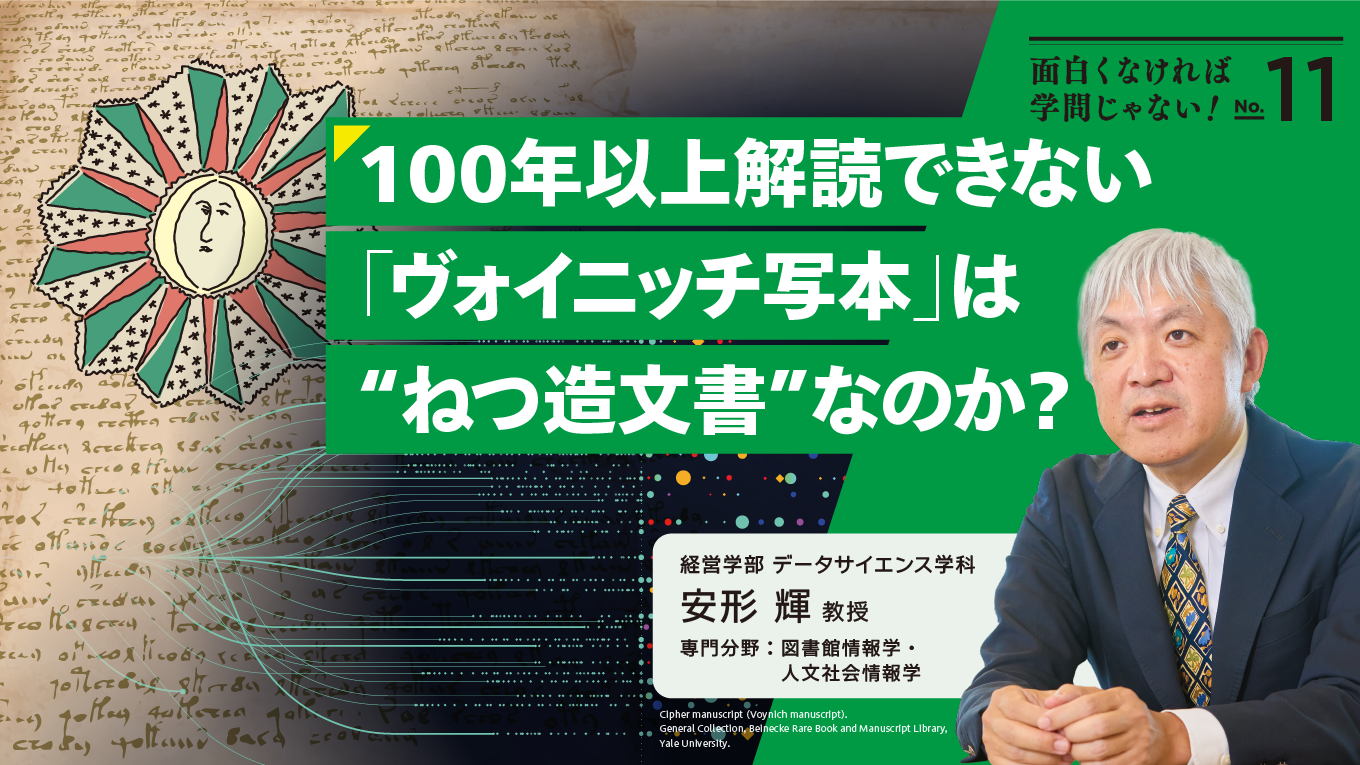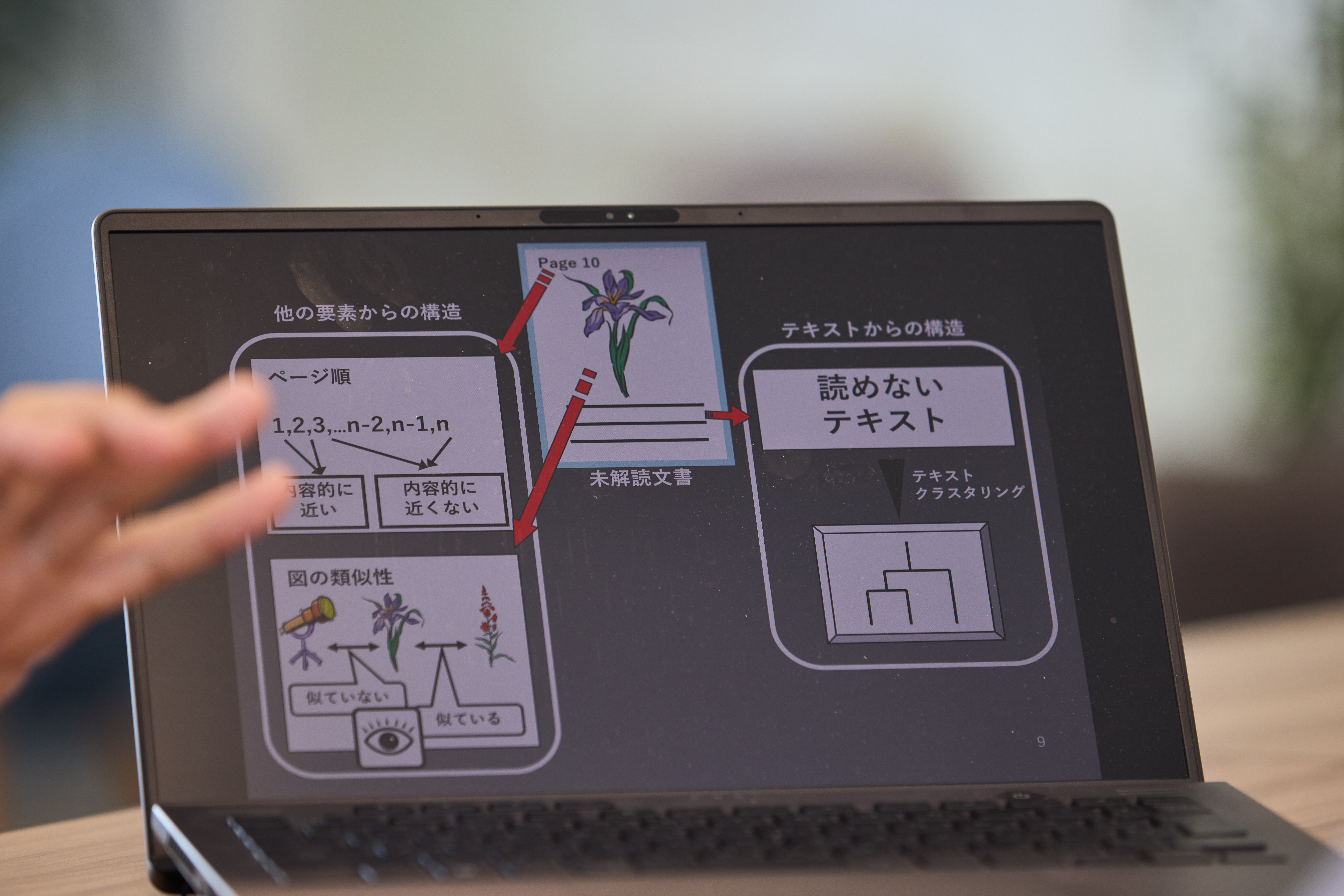
Undecipherable for over 100 years
The Voynich Manuscript
Is it a "fabricated document"?
The Voynich Manuscript
Is it a "fabricated document"?


#Asia University research
AGATA Teru Professor
Faculty of Business Administration Department of Data Science
2024.11.01
In the series "If it's not interesting, it's not academia!", we introduce research content and anecdotes of faculty members at Asia University. The 11th feature is Professor Akira Agata, Department of Data Science Faculty of Business Administration.

Since I was a child, books have always been close to me.
In elementary school, I borrowed and read books from the school Library (Library Administration), such as Edogawa Ranpo's "Boy Detectives" series, which many book lovers of my generation were crazy about, and the "Gentleman Thief Lupin" series, which was rewritten and translated for children. In junior high school, I remember engrossed in reading Kurimoto Kaoru's "Guin Saga" series, hoping to challenge myself to read a long novel. In high school, when I started commuting to school by train, I made the effort to read one book a day from the Hayakawa Bunko SF series during my commute.
Being such a book-loving boy, it was only natural that I chose the Faculty of Literature when I went on to the university affiliated with my high school. Within the Faculty of Literature, I was interested in the fields of Psychology and Library and Information Science, but after some deliberation, I finally chose to major in Library (Library Administration) and Information Science. At that time, my dream was to run a secondhand bookstore. I would sit leisurely at the register surrounded by many used books, and occasionally chase away customers who had been browsing for long periods of time with a feather duster (laughs). In terms of being surrounded by many books, I think that part of that dream has been fulfilled now as a university professor and Head Librarian.
However, as I was about to graduate from university, I felt the need to think about my future career options based on more "reality," so I took a job interview at a major printing company for a job related to books, and was offered a job. However, at the same time, my professor at university encouraged me to go on to Graduate School, and I was drawn to that option.
In Graduate School, I mainly research information science and databases, which are about how people search for information. During my undergraduate years, I had qualified as a Library (Library Administration), so I was thinking of working as a librarian at a university Library (Library Administration), but things didn't go as planned, and I ended up continuing on to a doctoral program. Looking at my career history, it seems like the path from undergraduate to Graduate School and now as a professor at this university was smooth, but in fact, I was always in doubt along the way, sometimes swept away, sometimes frustrated, and I think that I am where I am today after going through a lot of things. But looking back now, I think that's what makes life interesting. By the way, I still haven't given up on my dream of becoming a second-hand bookstore owner.
Is the Voynich Manuscript written in a "language"?

As mentioned above, as research, I have been research information science in a broad sense, such as Library (Library Administration) and information science, databases, etc. One of the data analysis methods I use in research is "text clustering," which is a method of automatically classifying multiple texts into various groups.
Shortly after I started working at a university, I came across the Voynich Manuscript by chance on the Internet.
The Voynich Manuscript is a representative example of an "undeciphered document" in which we don't even know what language it is written in, and has been a topic of discussion in many areas, not just Library (Library Administration) and information science, but also in novels, music, and more. The manuscript was discovered in 1912 in a monastery in Italy by Wilfrid Voynich, a Polish-American collector of ancient books. Since its discovery, many historians, linguists, and cryptography experts have attempted to decipher it, but even now, more than 100 years later, we still don't know what is written in it.
The Voynich Manuscript, which has over 200 surviving pages, contains indecipherable text and many pages are filled with illustrations of plants, herbal jars, tiny nude women, etc. Scientific analysis of the parchment used in the Voynich Manuscript suggests that it was produced in the 15th or 16th century, and there are records that seem to have mentioned the manuscript in the 17th century.
There was also a theory that this ancient document was a meaningless "forgery" created with some kind of intention. However, in medieval Europe, where books were a luxury item for the wealthy, it is hard to imagine that such an elaborate handwritten copy of over 200 pages would have been created to forge a document... This fact made the document more credible as "genuine". So, rather than "deciphering" the contents of the document, I decided to determine the possibility of deciphering it itself from the perspective of whether or not there is a written structure, in other words, whether or not a "language" exists.
This research is based on the hypothesis that natural language processing techniques that are applied to many languages can be applied to languages that are currently indecipherable. For example, if there are many web pages written in an indecipherable alien language, if those web pages are research by Google, it should be possible to search for keywords in the alien language.
As it happened that there was an expert on old manuscripts and printed books nearby, the two of us began research together. In a research paper published in 2009, we found a correlation between the unreadable text of the Voynich Manuscript and the structure inferred from its illustrations and pages, and were able to determine that it was most likely not a fabricated document. No other research had conducted a similar analysis up until that point, so this result can be considered a new finding.
Shortly after I started working at a university, I came across the Voynich Manuscript by chance on the Internet.
The Voynich Manuscript is a representative example of an "undeciphered document" in which we don't even know what language it is written in, and has been a topic of discussion in many areas, not just Library (Library Administration) and information science, but also in novels, music, and more. The manuscript was discovered in 1912 in a monastery in Italy by Wilfrid Voynich, a Polish-American collector of ancient books. Since its discovery, many historians, linguists, and cryptography experts have attempted to decipher it, but even now, more than 100 years later, we still don't know what is written in it.
The Voynich Manuscript, which has over 200 surviving pages, contains indecipherable text and many pages are filled with illustrations of plants, herbal jars, tiny nude women, etc. Scientific analysis of the parchment used in the Voynich Manuscript suggests that it was produced in the 15th or 16th century, and there are records that seem to have mentioned the manuscript in the 17th century.
There was also a theory that this ancient document was a meaningless "forgery" created with some kind of intention. However, in medieval Europe, where books were a luxury item for the wealthy, it is hard to imagine that such an elaborate handwritten copy of over 200 pages would have been created to forge a document... This fact made the document more credible as "genuine". So, rather than "deciphering" the contents of the document, I decided to determine the possibility of deciphering it itself from the perspective of whether or not there is a written structure, in other words, whether or not a "language" exists.
This research is based on the hypothesis that natural language processing techniques that are applied to many languages can be applied to languages that are currently indecipherable. For example, if there are many web pages written in an indecipherable alien language, if those web pages are research by Google, it should be possible to search for keywords in the alien language.
As it happened that there was an expert on old manuscripts and printed books nearby, the two of us began research together. In a research paper published in 2009, we found a correlation between the unreadable text of the Voynich Manuscript and the structure inferred from its illustrations and pages, and were able to determine that it was most likely not a fabricated document. No other research had conducted a similar analysis up until that point, so this result can be considered a new finding.
A wide range of research areas revealed through "Library (Library Administration) information science"

The paper on the Voynich Manuscript received a great response not only from linguists and bibliographers, but also from a wide range of people, and it marked a turning point for me as research. Initially, I began research out of my interest in "undeciphered documents" that I found on the Internet, but the research process made me realize once again that research topics that can be tackled under the keyword "Library (Library Administration) and information science" cover an extremely wide range of fields.
Regarding the Voynich Manuscript, "discoveries" are still being reported by various people from various angles, and I continue to follow the developments with interest.
Furthermore, I am currently working on research themes such as "internationalization of manga," "recalled out-of-print books," and "electronic books." Of these, "recalled out-of-print books" are books that have been discontinued for various reasons and have been recalled even after they were distributed in bookstores. The reasons for going out of print are diverse, including "content errors," "defamation," "use of discriminatory language," "violation of privacy," and "author's intentions." In fact, the first volume of the aforementioned "Guin Saga" series by Kaoru Kurimoto, which I loved to read when I was in junior high school, was also out of print and recalled due to a description of a certain illness, and a revised version was released after the author apologized and corrected it. I collect these out-of-print books from second-hand bookstores and online bookstores, and have set up a corner for "recalled out-of-print books" on the bookshelves in my Research Office. If you are interested, please come to Research Office. I will explain in detail the reason why each book went out of print and the impact it had on society. It is very interesting to see the state of people and society in each era through out-of-print books.
Regarding the Voynich Manuscript, "discoveries" are still being reported by various people from various angles, and I continue to follow the developments with interest.
Furthermore, I am currently working on research themes such as "internationalization of manga," "recalled out-of-print books," and "electronic books." Of these, "recalled out-of-print books" are books that have been discontinued for various reasons and have been recalled even after they were distributed in bookstores. The reasons for going out of print are diverse, including "content errors," "defamation," "use of discriminatory language," "violation of privacy," and "author's intentions." In fact, the first volume of the aforementioned "Guin Saga" series by Kaoru Kurimoto, which I loved to read when I was in junior high school, was also out of print and recalled due to a description of a certain illness, and a revised version was released after the author apologized and corrected it. I collect these out-of-print books from second-hand bookstores and online bookstores, and have set up a corner for "recalled out-of-print books" on the bookshelves in my Research Office. If you are interested, please come to Research Office. I will explain in detail the reason why each book went out of print and the impact it had on society. It is very interesting to see the state of people and society in each era through out-of-print books.
I want people to take part in this project with a sense of interest and personal involvement.

My seminar has themes such as "Library (Library Administration) and Information Science", "Media Information Science", and "Database", but I try to have each student prioritize their own "interesting" research. This is because I want students to value their own interests and concerns when they become university students, not what their parents or teachers told them to do. As was the case for me, it is not always the case that you find clear interests or goals during your university years. However, I believe that the meaning of "studying at university" is to keep searching for something that you find "interesting" in your mind, and when you find it, to tackle it as "your own business". The time before entering the workforce as a university student is a precious time when you can take on challenges without hesitation or fear of failure. Please make good use of it.
We at the university must also change with the times and provide education that responds to the diverse needs of our students. University Library (Library Administration), which hold many rare books and old manuscripts, are being asked what kind of services they should provide as the Internet and digital technology become more common as social infrastructure. As Head Librarian and research of e-books, I would like to listen to the opinions of university students and think about what a new Library (Library Administration) should be.
We at the university must also change with the times and provide education that responds to the diverse needs of our students. University Library (Library Administration), which hold many rare books and old manuscripts, are being asked what kind of services they should provide as the Internet and digital technology become more common as social infrastructure. As Head Librarian and research of e-books, I would like to listen to the opinions of university students and think about what a new Library (Library Administration) should be.
Related Links
- Faculty of Business Administration TOP
- Department Department of Data Science Faculty of Business Administration
- Four years of study Department of Data Science Faculty of Business Administration
- Faculty Faculty of Business Administration Department of Data Science Introduction
- Faculty Faculty of Business Administration Department of Data Science
- Faculty Faculty of Business Administration Department of Data Science